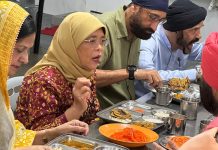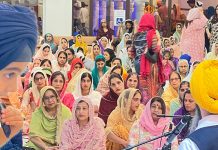
By Gurnam Singh | OPINION |
Like no doubt many other Sikhs throughout the world, I too have been reflecting on the meaning of Vasakhi, but this year there is an extra twist related to the coronavirus crisis, which is impacting the whole of humanity.
For Sikhs the North Indian harvest festival of Vaisakhi is associated with the birth of the Khalsa, the order of Saint/Soldiers established by Guru Gobind Singh on 14th April 1699. He asked his followers if they were willing to die for his beliefs and 5 came forward and they became immortalised as the ‘Panj Piaray’ or the 5 beloved ones. Along with his wife Mata Sahib Kaur, Guru Gobind Singh Ji administered the Amrit. And in an astonishing act of humility he then bowed the Panj Piaray and asked them to reciprocate the gesture. By doing so he elevated the downtrodden and gave them confidence to aspire to the highest ideals.
The context of this historic act was the need to build an organised and principled force to defeat, on the one hand the evil of the Mogul imperialists, and in the other, the corrupt Brahmanical ideology of caste divisions. This ancient pernicious practice had not only divided Indian society but had condemned the so called ‘shudra’ (lower) caste to the status of ‘untouchability’.
The ‘Khalsa di pahul’ initiation ceremony, where the Guru invited people of all so called caste backgrounds to drink the Amrit or nectar from the same pot, was nothing short of revolutionary and a direct challenge to the ruling elites of the time. In seeking to unite a hopelessly divided population, the Guru had to pay a big price, including sacrificing all his family and ultimately his own life. But his mission succeeded in dislodging the Moguls, on the one hand, and legitimising and popularising idea of human racial equality, on the other.
Though sadly today evil ideologies and tyrants have not disappeared, humanity as a whole is facing another dangerous genocidal enemy known as Covid-19 coronavirus. The big difference now is that this is a hidden enemy who operates according to a completely different set of rules. The coronavirus is not a visible enemy and operates by stealth and makes no distinction of race, caste or religion; we are all its enemies! So the question is how does the Khalsa confront such a destructive enemy?
Clearly, weapons, traditional or modern, are no match for Covid-19. To defeat this virus the armed forces are scientists, epidemiologists, health workers and community volunteers. Their weapons are protective clothing, labs, ventilators, drugs and medical appliances. And, unlike traditional wars, this is not a battle for territorial domination. What inspires this different kind of army is not to take lives but to save them. In other words, the battle facing them is not to defeat the Other, whether they are defined in terms of race, ethnicity, religion, nationality, class or political affiliation, but to save humanity.
And no doubt, if not defeated, the enemy will be controlled and life will return to some normalcy. But given the massive toll on people, families, communities and the global economy, we will be confronted with a second wave, of poverty, unemployment and unimaginable health problems. Again, traditional weapons of war will not be my use. Here we will need visionaries, humanitarians, politicians and ordinary people to rebuild a new world where we work toward uplifting all and protecting the planet. In the new historical context, this is and will be the mission of the Khalsa.
Whilst this years Vaisakhi will be a somewhat muted celebration, it doesn’t stop each and everyone of us recommitting ourselves to the highest ideals and virtues of the Khalsa, that are symbolised by the 5 K’s was all Khalsa Sikhs are required to keep.
The Kirpan – to promote justice and fight against all forms of oppression.
The Kesh – to promote acceptance of nature and natural beauty.
The Kashera – to promote human dignity and to protect us from all forms of sexual abuse.
The Kara – to promote unity and universality.
The Kanga – to promote healthy living, both physical and mental.
And so on this historic Vaisakhi day, as we all seek to make sense of and fight the coronavirus, may I wish you all peace, love and justice.
Waheguru ji ka Kahlsa waheguru ji ki fateh!
 [Gurnam Singh is an academic activist dedicated to human rights, liberty, equality, social and environmental justice. He is an Associate Professor of Sociology at University of Warwick, UK. He can be contacted at Gurnam.singh.1@warwick.ac.uk]
[Gurnam Singh is an academic activist dedicated to human rights, liberty, equality, social and environmental justice. He is an Associate Professor of Sociology at University of Warwick, UK. He can be contacted at Gurnam.singh.1@warwick.ac.uk]* This is the opinion of the writer and does not necessarily represent the views of Asia Samachar.
RELATED STORY:
In our moment of precarious togetherness, let us discover a new purpose (Asia Samachar, 26 March 2020)
Tainted by sexual abuse, Yogi Bhajan’s legacy in jeopardy (Asia Samachar, 7 March 2020)
ASIA SAMACHAR is an online newspaper for Sikhs / Punjabis in Southeast Asia and beyond. Facebook | WhatsApp +6017-335-1399 | Email: editor@asiasamachar.com | Twitter | Instagram | Obituary announcements, click here |































